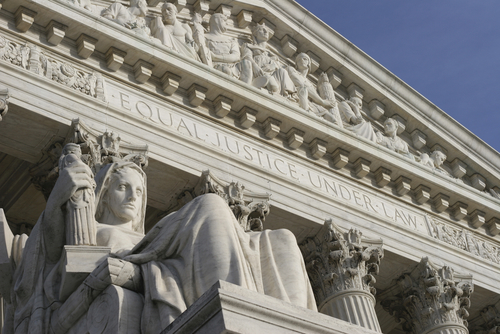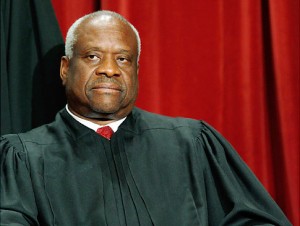So the United States Supreme Court handed down the opinion to the much anticipated Fisher v. University of Texas affirmative action case today.
It was anticlimactic because the court punted. It handed the case back down to the federal court (5th Circuit Court of Appeals) to apply the more stringent standard required when reviewing a challenge to a state benefit when race is a factor, Strict Scrutiny. Rather than consider whether the UT policy was narrowly tailored to serve the state’s compelling interest in advancing diversity in education, the court below merely consider if it had reasonable basis for its policy then offered the petitioners to rebut that presumption.
It did not rule substantively on the case where a white woman denied admission to the selective university blamed the schools’ affirmative action policy which considers race among over a dozen of other factors when deciding who to admit among those falling below a minimum auto-admit academic index.
The petitioner in the initial case did not have the qualifications to get admitted under a policy that permits automatic admission to the top 10% of all high schools in the state. That policy was instituted after the Supreme Court in Hopwood v. Texas overruled the university systems’ previous Affirmative Action policy.
Knowing that there are large pockets of segregated areas in the state where high schools are almost 100% minorities, the law was a way to ensure racial diversity but without explicitly using the word race. It was facially race-neutral though had racial impact in effect.
UT used a Holistic index policy for those not meeting a minimum academic index where it took into account a host of factors including military service, honors and awards, extracurricular or community activities, publications, history of overcoming disadvantage, personal essays, leadership qualities, extracurricular activities, community service, family responsibilities, family and school socio-economic status, whether the applicant comes from a single-parent home, whether she worked during high school, whether languages other than English are spoken in her home, and other factors.
Racial minorities have not been the only ones to benefit under that policy: women, a rural white, for example, who was the first in his family to be admitted to college, those who overcome handicaps or other disabilities, some from poor backgrounds and others have too.
Rather than point blame on those admitted on one of the other factors over her, Fisher filed suit challenging the inclusion of the racial factor alone, saying it violated the 14th Amendment Equal Protection clause. Ironically, the law was created to protect African Americans from discrimination but has been used more recently in school related cases by litigants in reverse discrimination lawsuits.
Many in the African American community are pointing out the sole African American on the bench Clarence Thomas’ concurring opinion where he questions the value of considering diversity in college admissions, and states he would overrule the UT policy and even its 10% auto admit policy altogether.
Wowza!
Thomas stated his opinion that Affirmative Action could hurt minorities by casting doubt on their accomplishments and putting some students in classes they are ill-prepared to succeed in.
He went on to compare the arguments of affirmative-action supporters with those of segregationists, saying UT, by affirming the need for race-based classifications are embracing the policies of Jim Crow south.
“There is no principled distinction between the University’s assertion that diversity yields educational benefits and the segregationists’ assertion that segregation yielded those same benefits,” he wrote.
Although many are upset, I get what Thomas was stating.
Personally, I’ve recognized being given treatment when the perpetrator presumed me to be less qualified or intelligent than even junior members of my peer class. I recall one incident how a competitive partner at the law firm I worked at went out of his way to avoid me getting assigned to his team during a bus-ride trip Trivial Pursuit type game. Then at one point during the game I figured out an answer that stumped everyone on the bus for a while and the way everyone was really really surprised and patted me on my back after my correct reply had me question whether they would have been so “shocked” had a white male gotten the answer right.
I mean by the time I worked there, I had passed three state bars, earned two law degrees, argued before judges, gotten published in a legal journal and hired by an exclusive international law firm.
What more did I need to do to prove I was “qualified”?
Was I going to have to carry the burden of being presumed an Affirmative Action hire forever?
The answer, sadly may be yes! Even over the last four years of writing my column, The Politics of Raising Children, for the Washington Times Communities section, I’ve had commenters who disagreed with my position on an issue leave remarks essentially stating that I must have been afforded a column to satisfy some racial quota.
Some people will always see your race first and color their response to your or how to react or respond to your skills and non-race-related behavior or position after that.
When my husband got admitted into my alma mater Georgetown University Law, a friend jokingly asked him if I had helped him get into the school, sort of insinuating that he couldn’t have done it on his own. Meanwhile, my husband had scored high enough to get himself into the University of Virginia, University of Michigan, and a score of other top selective law schools. He surpassed their basic academic index for admission and didn’t even require the diversity level consideration. Thus, he is presumed to not have matriculated on his brains alone.
Sometimes it may be worth it.
For me, when I arrived at my law school, I vividly recall several incidents when I was made to feel my presence alone in class assisted my classmates’ understanding of law and its application. Getting the perspectives of someone who dealt with the issues differently because of cultural background and experiences must have enhanced and/or supplemented their learning experience. We should want lawyers who are empathetic to experiences of all their clients even if their backgrounds differed.
In Constitutional law class especially when issues related to Civil Rights came up, as the sole or one one of two African Americans in a class of 100, I’d feel the heat of all eyes on me as I fumbled to come up with a response to the professor’s question that was substantively right but also reflected the black reaction. In those days, I felt the burden of having to represent my entire race. I’d sweat, get hot under the collar and panic. What if I said the wrong thing? My answer could shape the perceptions of all in this classroom. At times, when certain topics came up that required the requisite black answer, people would just turn to me even if I didn’t raise my hand or wasn’t called on.
That was unfair pressure and burden. My classmates of European heritage didn’t have to be saddled with having to educate others. They were free to just be and learn. I didn’t have that luxury. I had to represent on behalf of all those who’ve been in my shoes but were not there to explain their experiences.
my A-ha moment
But then I have vivid recollection of an incident during one criminal procedure class. While discussing the challenges of stop and frisk laws and their potential discriminatory impact, the professor asked if it was wrong for unsubstantiated stopping and frisking to continue given the criminal justice systems duty and interest in protecting the general public.
One classmate piped up with the opinion that it was but a minor convenience even if one is innocent of wrongdoing to be stopped and frisked routinely because we all, as a society, should be interested in doing their parts to aid police find criminals.
Like a rocket grenade, every single one of the 5 black students’ hand in that class of about 150 shot up to reply to such asinine and clearly misguided thought.
I got picked and tried to enunciate how dehumanizing it must be for a person to be stopped daily on their way home from work or school because of their skin and be forced to squat on a sidewalk where their friends and neighbors can see.
It’s a minor inconvenience if you neither anyone you know have had to endure such humiliation. I don’t think I was poised and articulated in my response. Fortunately, the professor chimed in and essentially, better explained my frustration.
And just like that, it again became apparent the benefits of diversity in classrooms to at least challenge false notions of others’ based on their limited experiences.
Because there is high likelihood that an African American may have had an experience with racial profiling or have known someone who had, they would be able to share anectdotally their experiences and enhance classroom discussions and dialogue and enable others to see perspectives different than their own.
There is value in diversity.
Of course all in one race do not think or feel the same way on all issues, but there is high likelihood that they will have been in similar situations or have cultural associations or awareness governed by their shared experiences colored by race.
While minority students and or management employees may be presumed to be Affirmative Action admits or hires, some never question non-racial minorities presence or advancement the same way.
In the workplace brown nosers, those with familial or other close or prior relationships with management or those who play office politics may advance faster in some cases even when they may not be the most qualified.
Plum projects and key assignments may be afforded to those who bear the same physical, racial or gender of past success cases because they are presumed to be competent and more than qualified, and given the benefit of the doubt based on subjective internalized preference even before considering qualifications.
In the academic setting, athletic admits with substantially lower academic qualifications, admitees who have legacy or familial relationship with the school may also be advanced despite their inferior qualifications.
Few recognize yet do not challenge these instances.
Not all value diversity nor recognize its importance in public discourse and education.
Those who don’t many times are the same ones who falsely believe in the fallacy of total meritocracy in admissions, hiring and promotion.
Thus, even if Clarence Thomas had the power to eliminate the 10% rule, I question and wonder what he would have put in its place.
It is unclear if he supports laws and policies that would work to improve the segregated, under performing and less academically challenging schools in urban inner cities.
You cannot eliminate the solution to a bad problem without at least enunciating an alternative that addresses that problem.
Jay Jay Ghatt is also editor at Techyaya.com, founder of the JayJayGhatt.com and JayJayGhatt.com where she teaches online creators how to navigate digital entrepreneurship and offers Do-It-For-You Blogging Service. She manages her lifestyle sites BellyitchBlog, Jenebaspeaks and JJBraids.com and is the founder of BlackWomenTech.com 200 Black Women in Tech On Twitter. Her biz podcast 10 Minute Podcast is available on iTunes and Player.fm. Follow her on Twitter at @Jenebaspeaks. Buy her templates over at her legal and business templates on Etsy shop!






